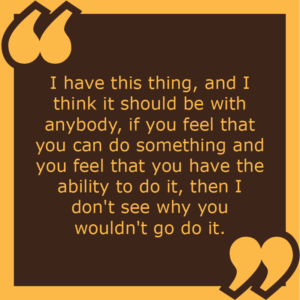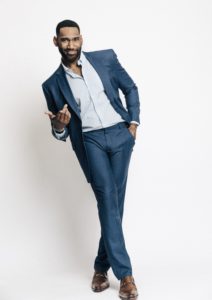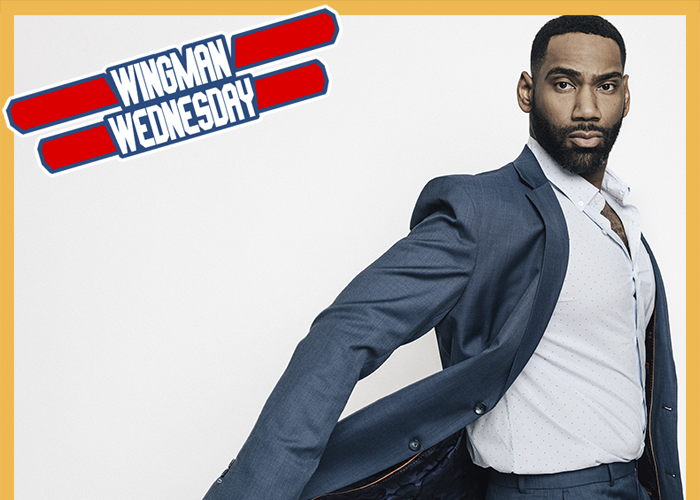
As a former professional football player who spent years inside the NFL, “Family Reunion” star Anthony Alabi embraces the parallels between his old career as an athlete and his new career as an actor. Like a well-managed locker room, a set can take on a family-driven atmosphere where impenetrable bonds lead to memorable results on the field, or in this case, the screen.
“It’s beyond the words on the page,” he said in an exclusive interview with TrunkSpace. “There’s got to be that stuff in between that can really show the audience, ‘Oh, there’s a real relationship here.’”
We recently sat down with Alabi to discuss tackling impossible careers, going against type, and why, like football, acting goes beyond the Xs and Os.
TrunkSpace: Professional actor. Professional football player. Both are careers that very few people ever get to enjoy. Do you feel like you’ve captured lightning in a bottle twice in terms of the opportunities that you’ve had in your career?
Alabi: That’s so funny you say that, because that’s always the kind of thing that I say. I tell people, “Don’t ask me to do it twice because I don’t think it’ll happen.” I feel very fortunate to have done what I did with football – to reach that level and to be able to play there and to leave under my own choice – and then be able to come and do this. And once again, it sounds good. It sounds like, “Oh you just went and did it,” but there was a lot of pain and suffering and tears. A lot of psychological heartache in between that. But in the end it all seemed to pay off.
My dad… I remember when I told him when I was leaving the NFL to retire and that I wanted to be an actor, and he was like, “What is it with you and impossible careers?” (Laughter)
My best friend kind of put it the best. I’m just kind of annoyingly ambitious. I have this thing, and I think it should be with anybody, if you feel that you can do something and you feel that you have the ability to do it, then I don’t see why you wouldn’t go do it.
TrunkSpace: There are 32 professional football teams, which means there aren’t a lot of spots available for people inside the NFL. With so much content being produced these days due to all of the various streaming platforms and cable networks, do you think it is easier to break into acting than it is football?
into acting than it is football?
Alabi: You would think that, but once again… there’s more volume of shows – more stuff – but there’s more actors. There’s more people to compete against.
I really wanted to set a couple of things in my head when I first started. The biggest thing was, 1.), don’t tell anybody you played football. And I think the big thing about that for me was making sure that people didn’t just immediately assume that, just because you were a professional athlete, that now you want to be an actor because you just miss the attention and you’re in it for the wrong reasons.
The second thing is I wanted to go against type. I knew that immediately when they saw me walk through the door, they were like, “Oh cool, you’re going to be the bouncer or the thug or the cop or the detective or just the big guy that doesn’t really say anything. You’ll kind of just always be intimidating and always just have a scowl on your face.” And that‘s not what I wanted to do.
TrunkSpace: Which is great because now you’re on a show with Richard Roundtree who has had to deal with that himself.
Alabi: Right, and we talked about that. It’s a big thing. They’re going to see how they see you until you change the perception, because we all know in this town it’s “perception is reality.”
I was fortunate enough to get with reps that really believed that and we were kind of parallel in the thought that we needed to go against type. We needed to put me somewhere different. And I think that did a lot.
TrunkSpace: As the performer, you also have to be willing to go that route and not just work to work, which is a difficult thing to maintain when you’re already pursuing a career where so much is out of your control.
Alabi: Right. And I think it’s a process. I think patience is something that’s underrated and I’m still learning. Immediately you want to come in and be like, “No, I just want to work. I want to get the work done.” That’s great, and you may start working a ton, and you’re a bouncer and your this and that, but then all of a sudden you’re capped as a costar or all you do are these small parts constantly where you’re always a mean guy in the prison. Or you’re the mean guy security guard or the mean guy corrections officer. You never kind of break out of that, that’s how they see you. It’s why I never shied away from the parts I get in like “Pee-wee’s Big Holiday” where I was a transgender hairstylist. I’m like, “I don’t care, I’ll play any of it,” because once they can see that, “Oh, he doesn’t care, he’s willing to kind of go there and do anything,” that’s when it frees you up to kind of be anything you want.
TrunkSpace: You’re playing against type in “Family Reunion” as well. Has the role of Moz helped to change perception?
Alabi: Yeah, it has, and I think more so than them seeing it, it was more of just having more screen time for them to see it. With a guest star, you don’t really get a chance to show all of it. It’s just kind of a snippet here or a snippet there. At most, if you get a top show, you may get a little more in the episode, but I think being able to have an entire series in a body of work with episode in and episode out, they can see it. “Oh wait, he can pull that off, or, “He is different.” And that’s what I loved about the show. It’s one of the things that I really, really hold onto with “Family Reunion,” is that Moz is not a traditional football player type.
When you look at Moz, and when you look at the way he interacts with his family – the way he interacts with his parents and in his relationship with Cocoa – it’s different. It’s different than the stereotype that we’ve all had where it’s like this big, black football player, kind of silent type, who doesn’t really interact much and where the kids are more of my wife’s problem and not mine. That’s just the stereotype, and like I said, perception is reality. But with all that being said, Moz is different. He’s funny and he’s strict when he has to be. He’s loyal and loving and caring about his parents and his wife and his family, and I think he’s whatever he needs to be in the moment. That’s what producers and casting can see is that there’s a dynamic there where it’s not just a single line throughout the series where Anthony/Moz is just funny. It’s not that. There’s dramatic moments. There are moments of anger, there are moments of comedy, there are moments of vulnerability. And I think all of those things, when they see that and they see that body of work, it suddenly now changes the perception and opens me up to do other things, which has happened.

TrunkSpace: So as a performer, when you’re spending a prolonged period of time with a character like you have with Moz, does it enhance your performance because you’re seeing so many sides to this person?
Alabi: It does. And I think, you have to understand too, day one, I can do all the research that I want… I can sit there and think of moments and background and really dive into the character of Moz, but I’m not going to know anything until the interactions really start. That’s the biggest thing. Once we started kind of getting into it… and then we got the 20 episode order, which is beautiful… but once that started happening, around Episode 5 or Episode 6 of filming, I started to realize, “Oh, I can speak this and I can speak that and this is my point of view of that and point of view of this.” When you start really getting to flesh out the corners, the deep corners of that character, things change. They’re characters, but in that world of “Family Reunion,” it’s a human being and just like any other human being, they have to evolve. And I think that’s the biggest thing. I think that over time, no matter what, you’ll see Moz evolve. Where it goes, I don’t know, because a lot of that has to do with writing, but a lot of it has to do with the interactions with the other characters on the show.
TrunkSpace: So then are there parallels to football in that regard where, say, your first day in a game you may have some nerves – same as being on set – but once you get beyond that and get more comfortable on the field, it becomes less about the experience and more about focusing on your job and what you’re there to do?
Alabi: There are a ton of parallels between football and acting and I would say one of them is that. I always learned, in football, when you’re prepared you move and when you move fast, you move competent. And with competence comes an ease. I think that’s the same thing in acting. I think if you show up on set, you’ve done the work, you broke down the episode or the scene and the moments that are in it – you’ve broken down what you’re going to do and you’ve made choices – I think when you prepare then you’re kind of quick on your feet. So if something happens in a scene, you don’t lose that moment because you weren’t prepared… you play off of it. And I think that’s where all the juicy bits and all the best stuff comes from, the stuff that just comes off of an interaction where you’re like, “I just think this is appropriate right here.” And for me, acting and football are very similar in that way, where there is an ease. I think once you’ve gotten that first line out, once you’ve gotten that first scene out, suddenly you’re comfortable and you get into a rhythm and you start to feel the music of it and you can just buy it. When you go on set you feel it and you know exactly how Moz would respond. You know how he would feel. You get the interaction. I think that is what helps as time goes on.
TrunkSpace: We’ve been in locker rooms. We’ve been on sets. When either is firing on all cylinders, there really is a family atmosphere present. That must be another welcome parallel between your two careers?
Alabi: Absolutely. I was telling my wife the other day because we were talking about it… it’s like I’m never not around family. And it’s great because I look at somebody like Loretta (Devine), and I feel like have a special relationship because she plays my mom on the show, but since day one, it’s always been this kind of loving, caring kind of relationship where I tease her and look after her and she is always there to give me some advice and always there to make sure that I’m okay. And she’s constantly just around and loving. If you look on set where Tia (Mowry-Hardrict) is, that’s where I am, and where I am, that’s where she is. We’re always together. I think those are the things that really build that relationship. That’s the stuff that people will see on screen where it’s like, “Oh, that’s not scripted. They just have that chemistry. They’re just close.”
And you’re right, it’s the same thing in football. There’s a reason why Peyton Manning and any good receiver he’s ever had were in sync. It’s because it’s beyond the Xs and Os. It’s beyond the words on the page. There’s got to be that stuff in between that can really show the audience, “Oh, there’s a real relationship here.” And that could be small things like a touch here on the shoulder or it could be a look when the camera’s not focused on you. It could be a little thing that you say under your breath that doesn’t have anything to do with the scene, but you say to each other. Those little interactions are what make people go, “Oh my God, I love them. They’re great.”
“Family Reunion” is available now on Netflix.


